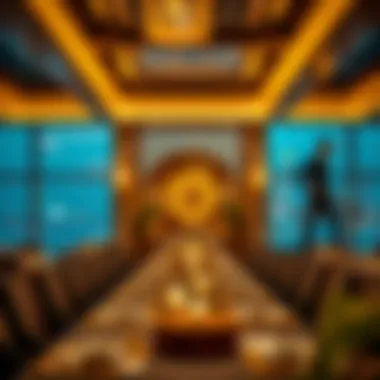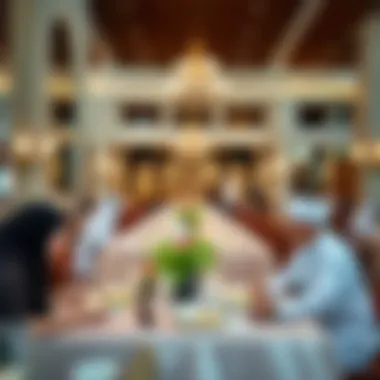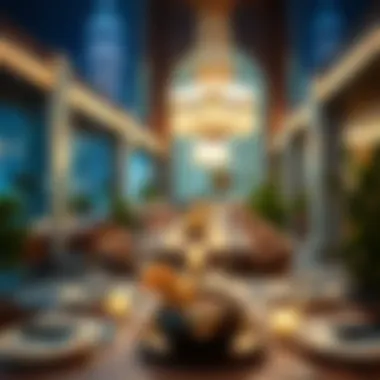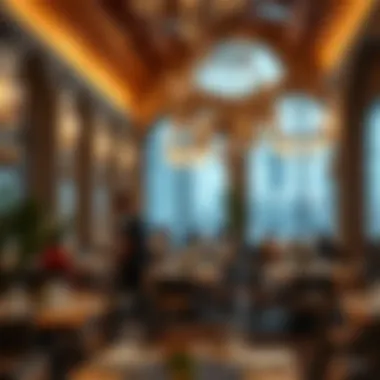Iftar Today in Dubai: Cultural Traditions and Dining Trends


Intro
Iftar, the evening meal that breaks the fast during Ramadan, resonates deeply within Dubai’s cultural framework. Each year, as the sun dips below the horizon, the vibrant city transforms into a tapestry of indulgence and tradition. This isn’t simply a meal; it’s a rich blend of commercial celebration, personal reflections, and social gathering. As one walks the bustling streets, the air thickens with the aroma of dates, fragrant spices, and grilled meats, creating an inviting atmosphere that encourages connection and community.
In a city where East meets West, the Iftar experience is a unique confluence of varied cultures. Traditional dishes like Harees and Fattoush sit alongside global favorites like sushi and gourmet burgers, reflecting Dubai’s diverse culinary landscape. For both residents and tourists, these meals provide not only sustenance but also an opportunity to partake in the communal spirit of Ramadan.
With Iftar gaining prominence in Dubai’s hospitality scene, restaurants and hotels are stepping it up a notch. Special menus, lavish buffets, and themed evenings have become the norm, catering to the eclectic tastes of the city’s residents and visitors alike. This article will delve into these traditions, the dining trends surrounding Iftar, and the ways this cherished meal is celebrated in the ever-changing landscape of Dubai.
Stay with us as we embark on an exploration that not only covers the essence of Iftar today but also highlights the threads that weave this tradition into the fabric of Dubai life.
Understanding Iftar
Iftar serves as a pivotal moment in the Islamic holy month of Ramadan, embodying both spiritual and social aspects that resonate deeply within the communities of Dubai and beyond. A meal that breaks the daily fast, it is often seen as more than just nourishment; it is a time for families and friends to come together, reinforcing ties and creating shared memories. The importance of understanding Iftar lies not only in its religious significance but also in its cultural implications within a diverse society like Dubai.
Definition and Significance
Iftar, derived from the Arabic word "fatoor," signifies the meal consumed after sunset during Ramadan. The act of fasting is a practice that promotes reflection, gratitude, and community spirit among Muslims worldwide. In Dubai, where a rich tapestry of cultures intersects, Iftar takes on unique dimensions, reflecting local customs intertwined with influences from expatriate communities.
The significance of Iftar can be summed up in a few key points:
- Community Unity: This breaking of the fast brings people together, fostering a spirit of camaraderie.
- Culinary Tradition: Iftar meals often feature an array of traditional dishes, showcasing the culinary heritage of the region.
- Spiritual Reflection: It serves as a daily reminder of discipline, patience, and the blessings of food and fellowship.
- Market Relevance: Understanding Iftar reveals insights into consumer habits and trends in the restaurant and hospitality sectors during Ramadan.
Historical Context
The tradition of Iftar dates back to the time of the Prophet Muhammad. Instances of communal dining after fasting were recorded in early Islamic texts, promoting both spiritual and social aspects of the practice. Over the years, this simple gesture of sharing food has evolved into a more elaborate celebration, steeped in local culture and seasonal foods.
In Dubai, the expanding population and diverse demographics have influenced the nature of Iftar gatherings. Historically, it was a more private affair, limited to family and close friends. However, contemporary practices have transformed it into grand feasts, catering to a blend of local customs and international flavors, often hosted in exquisite venues or marked by lavish buffets.
As one strolls through the bustling streets of Dubai during Ramadan, the lively atmosphere, coupled with the enticing scent of traditional dishes, underscores the importance of Iftar in the social calendar. It reflects not just a meal, but a cultural tapestry—one that honors heritage while embracing modern influences. Understanding the nuances of Iftar sheds light on the broader framework of community life in Dubai, making it essential for investors, realtors, and anyone interested in the city’s vibrant lifestyle and growing hospitality market.
Iftar Today in Dubai
Iftar, the meal that breaks the fast during Ramadan, is not just a necessary nourishment; it has grown into a vibrant tableau of cultural exchange, community bonding, and culinary exploration in Dubai. As this city thrives as a melting pot of cultures, Iftar presents a unique opportunity to witness the fusion of traditional and modern practices. With every sunset that marks the end of a day's fasting, the streets, parks, and households in Dubai come alive with the delightful aromas and sounds of shared meals.
Current Trends in Iftar Dining
In today’s fast-paced world, some distinct trends have emerged that shape the Iftar dining experience. Increasingly, people opt for outdoor settings, aiming to soak in the ambience of Dubai's famous vistas. Rooftop lounges and park gatherings offer more than just a meal; they bring the community under one sky during the holy month. This trend allows residents and tourists alike to connect with one another, sharing stories and traditions amidst the backdrop of glittering skyscrapers and warm desert breezes.
Moreover, many families embrace themed nights, where every evening features a different cuisine, ranging from Lebanese mezze to Indian biriyani, showcasing Dubai’s diverse culinary landscape.
- Sustainable Dining: Many eateries are now emphasizing eco-friendly practices, incorporating local ingredients, and reusable serving ware into their Iftar menus.
- Health Conscious Options: There is a growing demand for healthier options, featuring more salads, grilled meats, and vegetarian dishes without compromising the tradition.
- Takeaway and Delivery Services: In light of busy schedules, it's no surprise that takeaway options for Iftar have burgeoned, allowing families to enjoy an authentic dining experience at home without the fuss.
Popular Iftar Venues
Various locales are renowned for their splendid Iftar offerings in Dubai. Some are historical and significant, while others are modern marvels, each providing a distinctive atmosphere. At the heart of the city, The Souk Madinat Jumeirah offers a delightful mix of traditional Arabian style mixed with luxury. Here, diners can indulge in an extravagant buffet while overlooking serene waterways.
On the other end of the spectrum, Al Iwan in the Burj Al Arab features a spectacular spread, famed for its opulence. The setting itself, with its high ceilings and extravagant decor, adds to the overall experience. Visitors often find themselves captivated not just by the food but the environment that envelopes them.


- Time Out Market: This venue embraces a more laid-back atmosphere with a twist. Chefs from various popular eateries present their signature dishes, creating an eclectic Iftar feast.
- Local Neighborhood Cafes: For those seeking a more homey feel, smaller, local joints like Al Mallah and Al Safadi provide authentic meals echoing the local traditions, often filled with a sense of camaraderie and warmth.
Iftar Buffets versus Home Gatherings
The debate continues whether to head out for a lavish Iftar buffet or host a gathering at home. Both options have their distinct advantages, catering to different needs and preferences.
Iftar Buffets offer variety, convenience, and often a social atmosphere. Large gatherings at hotels or restaurants mean less work for the hosts. Everyone can sample a little bit of everything, allowing for culinary exploration.
In contrast, Home Gatherings invoke warmth and intimacy, fostering close-knit connections among family and friends. Preparing and sharing traditional meals at home adds a personal touch, often including family recipes passed down through generations.
Whichever route one chooses, the essence of Iftar remains indisputable—community, togetherness, and the celebration of tradition. As the sun dips below the horizon, people come together, their hearts and tables filled.
Iftar, in all its manifestations, encapsulates the spirit of sharing, not just food, but the values and traditions that bring diverse cultures together—a truly remarkable aspect of Dubai during Ramadan.
Culinary Aspects of Iftar
The culinary aspects of Iftar hold a special significance during Ramadan in Dubai. This morning meal is not merely about breaking a fast; it serves as a rich tapestry of flavors and traditions. Each dish holds stories that connect generations, and the preparation often involves collaborative efforts, forging bonds within families and communities. The Iftar table is where cultures meet and blend, showcasing both local and international culinary styles.
Traditional Dishes
The traditional dishes served during Iftar are the heart of the meal. One cannot talk about Iftar without mentioning dates. These sweet fruits are often the first morsel consumed to break the fast, symbolizing hospitality and abundance. Alongside dates, harira, a hearty soup made with lentils, chickpeas, and spices, often graces the table, embodying both warmth and nourishment.
Other staple dishes include samosas, which are fried or baked pastry filled with spiced potatoes, peas, or meat, and fattoush, a fresh salad made with mixed greens and crispy bread. These foods do not just satiate hunger; they kindle memories of shared meals and laughter around the table.
Expat Influences on Iftar Cuisine
In a melting pot like Dubai, expat influences shape the culinary landscape of Iftar. With people from different corners of the globe, it’s not uncommon to find a fusion of flavors. For example, you might encounter biryani—a fragrant rice dish with spices and meat—as an Iftar staple for South Asian families. Meanwhile, people from Italian backgrounds may add thoughtful touches like bruschetta adorned with Mediterranean vegetables.
This blend of cuisines allows residents and visitors alike to experience a global culinary extravaganza, meeting at a single table, fostering both culinary exploration and cultural exchange.
Drink Options and Hydration
As the fast ends, staying hydrated becomes of utmost importance. During Iftar, you will find a variety of beverage options to help replenish lost fluids. Laban, a tangy yogurt drink, is a favorite. Not only is it refreshing, but it also aids digestion after a day of fasting. Freshly squeezed juices, particularly those made from fruits like mango or pomegranate, add a vibrant touch to the meal. For some, sweetened mint lemonades topped with fresh mint leaves offer both reprieve from the heat and a delightful taste.
It's essential to remind everyone that while indulging in these treats, moderation is key. Overindulgence can lead to discomfort after fasting, undermining the spirit of the meal. Iftar is about savoring and celebrating one’s bountiful blessings, and the right balance of hydration is crucial.
"The culinary experience of Iftar is a journey through tradition, cultural intermingling, and communal joy."
In summation, the culinary aspects of Iftar in Dubai go far beyond mere sustenance. They encapsulate a celebration of community, heritage, and diversity. Whether it’s through traditional dishes that tell a story, the infusion of global flavors, or the emphasis on hydration, Iftar remains a significant event that shapes social connections during Ramadan.
Social Dynamics of Iftar
Understanding the social dynamics surrounding Iftar sheds light on its profound impact on community interactions. This sacred meal, breaking the fast during Ramadan, is more than just about food; it is about bringing people together. In the diverse cosmopolitan fabric of Dubai, Iftar is a microcosm of the city’s dynamic community relations.
Community Gatherings


Iftar traditionally encourages communal harmony. During Ramadan, the city hosts numerous gatherings that transcend cultural barriers, showcasing unity among residents. Friends and families come together to share meals, and even workplaces organize Iftar events, linking colleagues through shared experiences.
- Cultural Fusion: Many communal Iftar events present a delightful fusion of culinary heritages. One can find dishes from the local Emirati fare, such as harees, juxtaposed with international offerings like Italian pasta or Indian biryani. This melting pot of flavors reflects Dubai's rich multicultural environment.
- Public Spaces: Parks and open-air venues frequently become hotspots. For instance, venues like the Dubai Mall and Al Seef host Iftar events where the community gathers, creating a palpable sense of joy and belonging. People of varied backgrounds interact, sharing not just food, but stories and laughter.
Community gatherings can also extend beyond the festive atmosphere. They sometimes provide crucial resources for those in need. Charity-based Iftar initiatives, organized by NGOs and local organizations, aim to provide meals to less fortunate individuals. This aspect underscores the compassion found within the community, reinforcing bonds that extend well beyond Ramadan.
Role of Iftar in Strengthening Bonds
The breaking of the fast serves as a crucial instrument in solidifying family ties and friendships. Time spent together during Iftar allows individuals to reconnect and share experiences from their daily lives, often strengthening their emotional bonds. Even the simplest gatherings foster communication and collaboration, essential components of personal relationships.
- Shared Traditions: In many families, Iftar rituals are passed down through generations. The preparation becomes a collective effort, where older members impart traditional recipes to the younger generations. This practice nurtures a sense of identity and belonging and helps bridge the generation gap.
- Inclusivity: Iftar meals are often inclusive, inviting friends and neighbors from varying cultural backgrounds. Such interactions encourage understanding and respect for diversity. As different cultures interweave through shared meals, mutual respect flourishes.
"The act of gathering for Iftar embodies a timeless pursuit: the search for both community and connection in our fast-paced lives."
In summary, the social dynamics of Iftar offer a reflective glimpse into the communal spirit that characterizes Dubai during Ramadan. The blend of tradition, modernity, and inclusivity during these gatherings paves the way for enriching experiences that resonate well beyond the fasting month. Observing these interactions reveals that Iftar is not merely a routine; it's a celebration of life, shared humanity, and connectedness.
Market Insights: Dining During Ramadan
Understanding the landscape of dining during Ramadan in Dubai is crucial, not just for investors and restaurateurs but for everyone involved in the hospitality sector. This period presents a unique opportunity characterized by shifting consumer patterns and increased participation in community-oriented activities. Analyzing these market insights can help navigate the complexities of this vibrant phase of the year, ensuring a profitable and respectful approach to the sacred month.
Consumer Behavior Trends
During Ramadan, consumer behavior undergoes a notable transformation. As families and communities gather to break their fast, there’s a marked shift towards larger meal sizes and more luxurious dining experiences. People often seek to indulge in a variety of cuisines, not just traditional dishes, reflecting the multicultural fabric of Dubai. The desire for diverse options is evident, with many choosing to explore unique dining experiences that are healthier and diverse.
- Increased Spending: It’s common for consumers to loosen their purse strings during iftar. This trend can be attributed to the emphasis on sharing meals with family and friends. Dining establishments report a rise in per capita spending, especially on high-end buffets and unique tasting menus.
- Preference for Customization: More diners look for customizable menu options. Restaurants offering create-your-own dishes or adaptable buffets tend to draw more foot traffic.
- Health-Conscious Choices: With fasting occurring throughout the day, diners are more mindful about what they consume at iftar. There's a rising demand for wholesome ingredients, organic options, and smaller portion sizes, prompting eateries to adapt their menus accordingly.
Emerging Iftar Market Opportunities
As the demand for iftar dining grows, so too do the opportunities for new ventures and existing brands to expand their influence. Investors and developers can look at several emerging market opportunities that align with the evolving consumer preferences:
- Specialized Food Trucks: The trend of food trucks offering quick, gourmet iftar options is gaining traction. This flexibility allows them to cater to communities and events, tapping into a market that values convenience and variety.
- Branded Events and Collaborations: Partnering with local chefs or influencers to create exclusive iftar experiences can drive engagement. These events often attract media attention, further boosting visibility and foot traffic.
- Sustainable Practices: With an increasing focus on sustainability, restaurants embracing eco-friendly methods—from sourcing to packaging—are likely to resonate with the modern consumer. This approach is not just good for business but aligns with the values of a conscientious clientele.
“During Ramadan, eating and sharing meals transform into a celebration of community and joy. The dining market capitalizes on this spirit, offering experiences that transcend traditional dining.”
In summary, the dining atmosphere during Ramadan in Dubai is richly layered with opportunities and unique challenges. By understanding consumer behavior and leveraging emerging market trends, those involved in dining and hospitality can contribute to a meaningful, respectful engagement with this essential aspect of Dubai's culture.
Iftar and Real Estate Connections
The intersection of Iftar practices and real estate in Dubai reflects not just cultural rituals but also economic dynamics at play. As Iftar brings people together, it influences various aspects of community lifestyles, which can directly impact real estate values, neighborhood appeal, and the hospitality sector's performance. Investors and homebuyers looking to navigate the Dubai property market should consider how the vibrancy of Iftar traditions can enhance the desirability of certain locales.
Impact on Hospitality Sector
During Ramadan, there’s a noticeable spike in demand for hospitality services, from lavish hotel buffets to intimate community iftars. This increase is driven by both residents and tourists who seek to partake in the communal experience of breaking fast after sunset. Many hospitality businesses have tailored their offerings to align with the spirit of the month, promoting special Iftar menus that showcase a blend of traditional and modern cuisines.
- Key Contributions:


- Hotels frequently innovate by collaborating with renowned chefs to create themed Iftar experiences, attracting both local and expatriate communities.
- Restaurant chains, recognizing the appeal of Iftar, often extend their operating hours to cater to the after-sunset crowd, ensuring they capitalize on the bustling demand.
- Part of this hospitality boom is the use of outdoor settings, allowing families to gather and celebrate the evening together under the city’s splendid skyline.
The ripple effect can be seen in the hospitality sector's revenues, often peaking during this festive season. More importantly, investors are finding value in properties near adequately serviced neighborhoods, where Iftar gatherings boost local commerce.
Influence on Neighborhood Dynamics
Iftar serves as a glue that strengthens community ties. Neighborhoods bustling with shared Iftar experiences foster a sense of belonging among residents. More than just a meal, these gatherings promote cultural exchanges, often evident in diverse areas like Al Quoz and Deira, where various backgrounds merge to create a unique blend of traditions.
- Homebuyers and Renters are often attracted to neighborhoods where community spirit thrives, typically characterized by vibrant Iftar events. A strong sense of community can increase the perceived value of properties, making them more appealing.
- Developers are noticing these dynamics and increasingly focus on crafting residential spaces equipped with communal areas designed specifically for gatherings during Iftar and other festivities, enhancing social interactions within the building or community. This also caters to the growing trend of mixed-use developments, where living spaces are integrated with dining and entertainment options, enriching the local lifestyle.
"Iftar represents more than a meal; it symbolizes community, family, and belonging, elements that are critical in evaluating residential investments."
Overall, Iftar not only contributes to the atmosphere of a neighborhood but also shapes the real estate landscape in Dubai, driving both demand and pricing for residential and commercial properties as perceptions of community value continue to evolve.
Cultural Sensitivity and Iftar
As a city renowned for its rich tapestry of cultures, Dubai offers a unique perspective on the experience of Iftar. Understanding cultural sensitivity surrounding this tradition is crucial, especially considering the diverse population residing in this bustling metropolis. The nuances of Ramadan observance and the communal spirit surrounding Iftar can be profoundly impacted by how individuals engage with these customs.
Respecting Traditions
Respecting the traditions of Iftar goes beyond merely breaking bread after sunset. It involves a deeper appreciation for the customs that define this sacred moment for millions. In Dubai, local families often prepare elaborate meals that echo the flavors of their heritage. These meals are rich with stories and memories, passed down through generations. When non-Muslims participate in Iftar, it is essential to approach the situation with respect. This may include seeking a deeper understanding of the various dishes served, many of which hold cultural significance.
Today, the fusion of traditional dishes and modern culinary trends highlights the importance of preserving cultural integrity. For instance, the popularity of dishes such as Harees or Koshari emphasizes a shared cultural heritage, while also allowing for the inclusion of international ingredients and flavors. Respecting these traditions includes acknowledging both the food and the practices—such as the timing of meals, prayer, and community gatherings—that contribute to the essence of Iftar.
Encouraging Inclusive Celebrations
Inclusive celebrations during Iftar can foster a sense of community among diverse groups. By encouraging a spirit of togetherness, the act of breaking fast can transcend cultural boundaries. Residents and visitors alike can partake in community Iftar events, where various cuisines and traditions blend harmoniously. This is not just about food, but also about the sincere friendships formed over shared meals.
To encourage inclusivity, local organizations often host public Iftar gatherings at parks or community centers, where people from different backgrounds come together to celebrate. Such initiatives empower individuals to share their unique cultures, while also creating spaces where others can learn and appreciate these narratives.
Furthermore, it’s vital for businesses within the hospitality sector to offer Iftar menus that reflect this diversity. Restaurants and cafes can attract a broader audience by ensuring their offerings cater to various dietary needs and preferences. Some may opt for vegetarian or vegan options, while others might focus on regional dishes from a variety of cultures.
"Embracing cultural diversity not only enriches the experience of Iftar but also reinforces social bonds that make Dubai a truly global city."
Closure: The Essence of Iftar in Dubai
The practices surrounding Iftar in Dubai reflect not just a time for breaking fast but a multifaceted cultural phenomenon. This occasion has grown beyond mere tradition, bridging communities, and forming lasting connections among the diverse population of the city.
Reflections on Iftar's Impact
Iftar’s significance extends well beyond the act of eating. It serves as a powerful reminder of societal values and a cornerstone for community engagement. Families and friends come together, reinforcing bonds and enhancing the sense of belonging. The communal aspect of Iftar encourages inclusivity, allowing even non-Muslims to partake in the festivities and appreciate the local culture.
The impact is visible in social and economic dimensions. Restaurants like Al Fanar and Bateel create unique Iftar experiences that not only offer traditional dishes but also foster a sense of unity among diners. The influx of visitors seeking these experiences contributes to the local economy, enhancing Dubai’s reputation as a culinary tourism hub. Moreover, businesses often plan promotional campaigns around Iftar, capitalizing on the heightened demand, thus driving economic growth.
"Iftar is not just a meal; it's a celebration of faith, fellowship, and community."
Future Directions for Iftar Celebrations
As we look ahead, the evolution of Iftar in Dubai seems promising and ripe with potential. The ongoing trend towards sustainability and health consciousness might influence menus in the years to come. Upscale venues may introduce more organic and locally sourced options, addressing growing concerns about food sourcing and environmental impact. Moreover, as technology continues to shape how people dine, the integration of mobile apps to reserve Iftar experiences could become mainstream, allowing guests to navigate dining options effortlessly.
In addition, the rise of virtual gatherings during Ramadan has opened up avenues for online Iftar events, making it possible for people to connect across vast distances. This trend might persist even post-pandemic, promoting inclusiveness in ways previously unimagined.
The future of Iftar in Dubai is not solely about food; it is a continuous journey, intertwining culinary artistry with cultural storytelling, preparing the city for a Ramadan that resonates with significance and unity.



